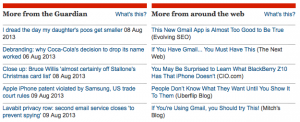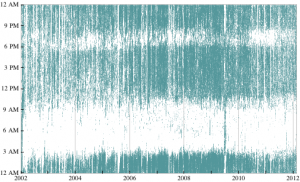Well, I’m in the news today. I was interviewed for a story in the Spectator, Mass e-vites can prompt gatecrashing which is about how word of parties circulates quickly on the web leading sometimes to uninvited (and violent) guests. Or it is about how Facebook is dangerous. I have blogged before about Facing Facebook (and privacy), but what strikes me now about Facebook is how it offers an alternative to e-mail. The argument goes like this:
- Email was developed when the internet (Arpanet actually) was a trusted circle. The net was flat and only people like you and answerable to you were on it.
- Email doesn’t work on an internet that is broad, global, and open. Spam is just one symptom of the problem of scale.
- What we need is a messaging system that lets us control who can write us; a system that priviledges the local (in the sense that people in my university have easier access); and a system that lets me use different types of messaging for different purposes (from short announcements to photos to private messages.)
Sounds like Facebook, doesn’t it? Which is why my children seem to use Facebook for communication and email for file transfer (as in moving a copy of a paper to print out to the lab at school.) Unfortunately I can’t move off email the way Donald Knuth did – it is now woven into the work practices of the university. I’m also not comfortable with a commercial organization like Facebook or Google having all my messaging. But I can start moving to private social networks for certain purposes. To that end I set up a private network for my extended family on Ning where we can keep track of birthdays, family photos, and information.
How about an open source project to develop a distributed social network messaging environment that could interface with email, that could be run by individual units, and that could offer control over types and sources of messages?




